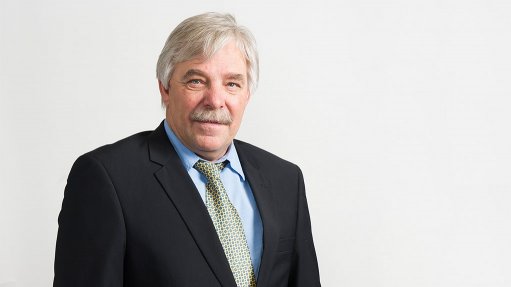
PPC CEO Johan Claassen
Cement producer PPC on Monday posted a 172% year-on-year increase in headline earnings to R231-million for the financial year ended March 31, while gross profit rose 3% on a strong performance by the group’s operations in Zimbabwe and Rwanda.
The group’s cement sales volumes increased by 6% to 5.9-million tonnes, while group revenue grew by 7% to R10.3-billion, and net profit attributable to PPC shareholders increased by 60% to R149-million.
An increase in cost of sales, as well as one-off costs relating to corporate action, the impairment of certain Democratic Republic of Congo (DRC) operations and restructuring costs, however, negatively impacted on the cement producer’s earnings before interest, taxes, depreciation and amortisation (Ebitda).
PPC explained that optimising the capital structure, increasing free cash flow, operationalising new plants and ensuring long-term sustainability and value creation were the key focus areas for the financial year under review.
“The group has achieved key milestones in delivering on its FOH-FOUR strategic priorities that were introduced last year,” said PPC CEO Johan Claassen.
He explained that these encompass the optimisation of the financial, operational and human capital of the group.
“Addressing these priorities has laid an important foundation that will enable us to create long-term sustainable value for stakeholders in future”.
In particular, Claassen highlighted that the company has made good progress towards achieving its optimal capital structure.
“The focus on liquidity and capital management is paying off as we have improved free cash-flow generation and reduced our debt to be in line with our revised long-term gearing targets and lender covenants,” he pointed out.
Group net debt dropped from R4.7-billion to R3.8-billion, while net debt to Ebitda improved from 2.3x to 2.0x.
Net cash flow from operating activities increased by 69% to R1.4-billion owing to positive working capital movements, which totalled R411-million, a 9% reduction in finance costs and a lower effective taxation rate.
During the financial year, PPC restructured its South African debt over a longer term of between three to four years at lower effective interest rate costs of between 10% and 11% and negotiated a two-year capital holiday for its DRC project funding debt.
RESILIENT PERFORMANCE
The company’s performance, Claassen added, has been resilient against the backdrop of challenging environments.
The DRC and Ethiopian plants were commissioned late in the financial year and are currently in the early ramp-up phase.
The performances from Southern Africa cement and materials were subdued while certain one-off costs had an impact on the company’s overall financial performance, Claassen said.
The performance from the Southern Africa cement division, which includes Botswana, was impacted on by a contraction in volumes, although 2.5% higher selling prices were achieved owing to the focused route-to-market strategy.
Volumes, Claassen added, are estimated to be better than the overall market volume decline.
The R50/t cost saving initiatives implemented during the financial year together with the ongoing rationalisation of its head office, the integration of Safika Cement, as well as the modernisation of the Slurry complex are expected to deliver further cost benefits, in line with the three megaplant strategies.
The Rwanda and Zimbabwe operations continued their strong performance, contributing well to group profits for the year.
Zimbabwe grew its revenue by 33%, supported by volumes increasing by over 45%, setting new sales records.
Rwanda grew revenue by 10% and volumes by 20% with its annualised capacity utilisation being above 65%.
The DRC and Ethiopia operations were in early stages of operation having been recently commissioned and, therefore, had a temporary drag on the group’s performance.
The materials division, incorporating lime, aggregates and ready-mix, delivered a muted performance for the year as it faced reduced demand and increased competition in a low infrastructure investment environment.
Tied to the achievement of PPC’s strategic priorities, Claassen averred that the company is working hard to entrench a performance driven culture across the business.
“As a first step in this regard, we have revised our values and brand proposition.”
Additionally, in delivering on its brand promise of ‘strength beyond’, PPC is working with employees to enhance its employee value proposition with a view to retain talent and skills in the business.
Meanwhile, the local environment is expected to remain challenging economically, Claassen lamented, but highlighted that the business will continue to defend and maintain its leading position and competitive advantage by leveraging its footprint, scale and focus on efficiency.
On the international front, strong demand is expected to be driven by Zimbabwe and Rwanda while the DRC and Ethiopian plants ramp up. The group has also completed its major capital expenditure (capex) investments, which enhanced and modernised its plants.
“Management’s focus is firmly on delivering improved profitability and further improving free cash flow generation in the short term. This will be supported by reduced capex together with significantly lower interest rate charges, while considerable focus has been directed towards strategic and operational initiatives to ensure greater competitiveness and improved efficiencies in markets exhibiting lower growth,” Claassen concluded.